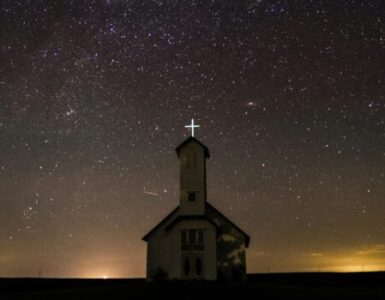In 2005, I had one of the most unforgettable experiences before our Eucharistic Lord. It was a lesson that I treasure to this day. No, our Eucharistic Lord did not speak to me. Instead, one of His beloved priests did. The experience took place in a small chapel at the Trinity Retreat Center (Larchmont, NY) alongside several postulants from the Franciscan Friars of the Renewal (CFRs).
I had ventured from the Midwest on what would be the first of three visits to discern with the CFRs during my senior year of college. The priest’s name was Fr. Benedict Groeschel, one of the CFR’s founders. Fr. Groeschel gave a brief talk during our Holy Hour. I had watched Fr. Groeschel on EWTN several times before and read a few of his books. He was one of my spiritual heroes.
In his New Jersey accent, Fr. Groeschel said to us beginners in the spiritual life: “All of you are messed up.” And then, turning my direction towards the end of the row, he looked directly into my soul: “And that goes for you, too, O’Hearn. And if you are not messed up, you should join the Jesuits.”
I was blown away that he remembered my name. I had spoken to him for the first time a few days earlier at a Thanksgiving dinner. Of course, I knew I was messed up, but I also held onto a lie: God could only truly love me if I was perfect.
Fr. Groeschel went on to say how each of us carries the remnants of the seven deadly sins of pride, lust, gluttony, sloth, wrath, greed, and envy in our souls. I remember he mentioned St. Teresa of Avila and how she said these sins remain in the “cellar” of our souls. But Fr. Groeschel said to not be afraid of these remnants of original sin.
The whole notion of the cellar would take on more meaning when I moved to the south ten years ago. Crawl spaces are no joke. You often find snakes, spiders, and every other reprehensible creature. I can now relate even more to Fr. Groeschel’s statement about the lingering effects of sin. Few people would take their guests inside their crawl space, let alone go there themselves.
But in the crawl spaces of our souls, in the deepest recesses of our brokenness, misery, and sin is precisely where God wants to meet us and heal us. Sadly, many of us put on a façade with others and even with God. We perform many spiritual exercises (all of which are beautiful) and frequent the sacraments, but we are scared to come face-to-face with these dark and secret areas of our souls. We mistakenly believe that God and others would not love us if they truly knew us.
On the same day as my encounter with Fr. Groeschel, I was introduced to a lifechanging book. Back in 2005, it was called Secrets of the Interior Life. It was written by a holy Mexican bishop named Archbishop Luis Martinez, who was the spiritual director for Blessed Conchita Cabrera. Today, this book is called Worshipping A Hidden God: Unlocking the Secrets of the Interior Life.
In it, there’s a striking quote that pierced my soul in a similar way as when Fr. Groeschel spoke to me. Archbishop Martinez declared:
Our nothingness and our misery constitute the force that attracts our Lord. Oh, foolish people that we are, who believe that it is our natural talents, our good works, and our virtues that attract our Lord; and who, therefore, often wish to parade all this when we present ourselves before Him.1
As the book points out, our good works and virtues are necessary, but they are the fruit of God’s love and grace.
Archbishop Martinez makes another salient point with Our Lady. “What He [God] saw in Mary before all these virtues, graces, and spiritual riches is what He sees in all creation, which is of itself is nothing more than lowliness and nothingness.”2 Did not Our Lady declare, “For he has regarded the low estate of his handmaiden”? (Luke 1:48).
Visiting the Friars was eye opening for another reason. Up to this point, I had achieved great academic and athletic success. But, for the first time in my life, surrounded by these “holy” postulants, I felt that I was not good enough. God showed me several hidden sins that I had buried under the cloak of piety. Through spiritual direction and God’s grace, I realized that I had been trying to earn the Father’s love throughout my life as I had tried to earn my parents’ love and admiration.
Almost twenty years later, I am realizing that I do not have to be perfect to be loved by God. There is no earning His love. When I sin, His mercy is there. When I say my Rosary imperfectly, His mercy is there. When I cannot make it to daily Mass, His love is still there.
There are times when I realize how far I am from sanctity and how miserable I am. In those moments when I want to despair or pridefully ignore my wretchedness, I recall the words of Fr. Groeschel and Archbishop Martinez. Or as the lyrics from the song “Misery” by Soul Asylum state, “They say misery loves company.” Yes, our misery loves God’s company. God does not want to see us proud and inflated but lowly and humble. If we need further proof, just read the Parable of the Pharisee and the Tax Collector (see Luke 18:9–14). The pharisee praises himself while the tax collector recognizes his misery.
Our misery is the pathway to humility. Our misery is the magnet that draws God’s mercy. Let us never be afraid of our brokenness. Instead, let us be genuine with God and others. God wants to redeem everything in our lives, especially the sins and weaknesses that we hide in the crawl space of our souls.
Now, do not keep your attention only on your own misery—this can lead to despair, self-hatred, and even false humility. Rather, keep one eye on God’s mercy and one eye on your misery. For our misery draws God’s company. And, like the best of Fathers, God longs to hold His frail and weak children closer to His heart than His strong and perfect children because the former need the Divine Physician even more.
Image retrieved from Pinterest
1Martinez, Worshipping a Hidden God, 53.
2Martinez, Worshipping a Hidden God, 55.










